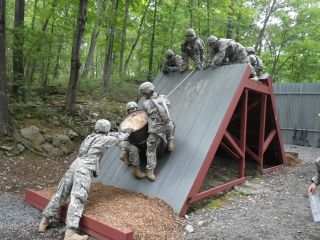Intelligence
Grit and Achievement
Gritty people have “The Right Stuff” to succeed.
Posted March 1, 2014
Try to imagine yourself in the following situation. You just arrived at West Point, where you are beginning the first day of a four-year program leading to a Bachelor of Science degree and a commission in the United States Army. You graduated near the top of your high school class, were the captain of your school’s basketball team, and you were a leader in a variety of student clubs and activities. You look around at the other 1200 new cadets, all of whom were also extremely successful in high school. West Point is a good fit for you, but still you wonder, do I have what it takes to complete four years of rigorous academic study, exhausting physical development, and challenging leadership training? In short, do I have the right stuff to succeed in this very daunting task?
Traditionally, psychologists have argued that general intelligence is the best predictor of success in situations like these. Thousands of empirical studies have shown that intelligence (or its close cousin, aptitude) predict success in a wide variety of academic and vocational pursuits. Indeed, when you applied for admission to West Point, your SAT/ACT scores, high school grade point average, and high school class rank – all indicators of general intelligence – were heavily weighted in the decision to admit you.
But for completing your first summer of basic training at West Point, those thousands of studies were wrong. University of Pennsylvania psychologist Angela Duckworth1 found that for West Point cadets, the single most important factor in predicting who would successfully complete West Point’s Cadet Basic Training (CBT) was not intelligence at all. Rather, it was their score on a 12-item questionnaire called “grit” that best predicted who would remain at West Point following the rigors of CBT. Grit is a personality construct that represents an individual’s capacity to complete long-term, challenging goals. New cadets who were in the top 16 percent of their incoming class in grit were twice as likely to complete CBT than their less gritty counterparts. Gritty cadets basically adopted the attitude that they would finish CBT, no matter how hard it was, or else. They simply could not be induced to give up. Importantly, Dr. Duckworth found that gritty cadets were no more or less intelligent than less gritty cadets, and aptitude measures did not predict CBT completion.

Soldiers complete an obstacle course during a leader reaction course exercise (photo courtesy of Stephen Flanagan)
Most of us don’t elect to go to West Point, but we all have highly valued but challenging goals in life. Excelling in your job, completing a graduate education, or perfecting your athletic performance all require grit. One of the most interesting findings that Dr. Duckworth and her colleagues reported was that community college students are among the grittiest people, on a par with those pursuing advanced degrees. Anyone who has taught in community colleges will recognize the truth of this finding. Typically, community college students have a firm educational/vocational goal in mind. They often work full-time or nearly full-time. Many are the parents of small children. Only the grittiest of people can juggle all of these demands and still succeed in college.
Psychologists will continue to refine the construct of grit. I suspect it is manifested in different domains. For example, there may be task-completion grit (never giving up until the goal is achieved), emotional grit (facing difficult situations head on and dealing with the joys and disappointments of life in a mature way), social grit (sticking with important relationships, through thick and thin), and physical grit (our Olympic athletes would be high in this). I used to be a law enforcement officer. My combat shooting instructor maintained that while it was ok (although clearly not desirable) to be found dead following a shootout, we should be clutching a pistol with an empty magazine!
I should point out that intelligence is, of course, important in understanding human achievement. No matter how determined and gritty, someone deficient in math aptitude will not be successful in pursuing a doctoral degree in engineering. And a lot depends on what we are trying to predict. Completing CBT at West Point is a “gut check,” not something that requires the application of high verbal and quantitative skills. On the other hand, after completing CBT, cadets begin the academic portion of their West Point experience. All cadets, regardless of their academic major, are required to take courses in mathematics, physics, chemistry, and engineering (just to name a few). Grit is predictive of academic achievement, but only incrementally so above the role of intelligence.
You may be wondering how to become grittier. There is no simple answer. Grit, as measured by Dr. Duckworth’s scale, represents a fairly stable trait. Nevertheless, humans are clearly capable of personal development. Anecdotally, I believe that military training itself is a grit building experience. Basic training ensures that new soldiers become physically strong, build confidence, and learn to overcome barriers to success. The military obstacle courses you have seen depicted in movies are far more about building grit and confidence than they are about improving physical fitness. Similarly, completing other challenges in life, from improving sports performance to completing college, may allow us to strengthen our grit muscles. My recommendation is to set challenging goals, work progressively toward accomplishing them, and reward yourself for steps along the way.
To draw an analogy, life is itself an obstacle course. Just like a new soldier completing a seemingly impossible obstacle for the first time, we can learn to marshal our personal and social resources to achieve the challenging goals that make life worth living.
1 Duckworth, A.L., Peterson, C., Matthews, M. D., & Kelly, D. R. (2007). Grit: Perseverance and passion for long term goals. Journal of Personality and Social Psychology, 92, 1087-1101.
Note: The views expressed herein are those of the author and do not reflect the position of the United States Military Academy, the Department of the Army, or the Department of Defense.


